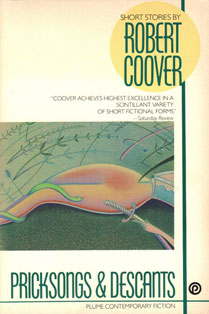I am surprised that I did not read this much earlier than I have. I discovered Coover near the beginning of college, and I was a big fan of "The Babysitter," but I barely gave the collection from which it is drawn a look. Instead, about ten years later, I read his novel John's Wife. The reason for this was threefold. One was that a coworker of mine explained to me the premise of his novel about baseball, which got me intrigued. Second, I had no access to a library at that time, so to meet my usual reading load, I was dependent on what I could find cheap in remainder bins or used. And John's Wife happened to be one of them. And then there was this: John's Wife began in a very interesting manner.
Unfortunately that novel got lost in its strangeness, becoming so inordinately weird that I lost interest about two-thirds of the way through (though I did finish it). I didn't return to Coover again.
Until now. And I wish I could say that I was mistaken in failing to read Coover for all these years. I can see how his work might have appealed slightly more in my early twenties, but I could also see myself not being that much more moved. That isn't to say I was not interested in his techniques--and in fact I still find those fascinating. Long before I had a computer or before the Internet was a widely used public utility, Coover was talking about the use of hypertext in fiction. I thought the ideas intriguing, but I didn't quite know how they would work or what they meant, not having the technology to refer to. The article, for those interested, is available here at the New York Times.
However, this Coover book is, as it is probably meant to be, deliberately alienating in many places, and I was left as if I were watching a showman, but in doing so, the showman fails to be a showman because I continue to see him as such throughout.
The stories in this collection are very much self-conscious. They are, many of them, a rerendering of fairy tales. They consider the process of storytelling itself, how we come to create narratives and what that means. They are also very male-centric stories, focusing often on sex and the female form. But the book is called Pricksongs, so what should be expected? Perhaps, Coover is intimating the sexual desire and story go hand in hand. Given how much best-selling fiction is romance or erotica, that's probably true.
The book opens with a prologue that makes the tie-in to fairy tales explicit. From there, the collection moves to a story called "The Magic Poker," which might qualify as my second-most favorite of the book (perhaps, "The Elevator" could also take the position). Coover is explicit here in saying the story is a story, telling us that he is the author and that he is about to introduce a character or that he regrets introducing a character because he seems to have little to do with the story, and so on. Vaguely, it involves two sisters who find a magic poker--one attracted to it, one repulsed; one who turns it into a prince and one who does not. The poker stands in for the frog the way you might expect the male anatomy to stand in for the prince here.
"Seven Exemplary Tales" features a prologue of its own and seven very short stories--some of them again, retellings of famous other stories. "The Elevator" discusses a man who plots revenge for constantly being accused of flatulence, when in fact another man is the one responsible. As with "The Babysitter" it ends up including several plotlines of possibility--sex with the woman who runs the elevator, revenge, the elevator dropping everyone to their deaths, being let off on the wrong floor or at a floor from which there is no return, and so on. "Quenby and Ola, Swede and Carl" recounts the tale of a family who lives in a touristy fishing area and the man who comes to fish with them, told as per usual with Coover, out of order and with seeming conflicts in terms of what actually happens. "A Pedestrian Accident" focuses on a man who is hit by a truck but is told as a kind of farce.
Another theme of this Coover book is performance. "Romance of the Thin Man and Fat Lady" recounts circus performers, for instance. And the final story in the collection involves a magician, acting as a kind of epilogue for the collection, one in which the magician can perform some great feats but in which he will inevitably disappoint, as indeed, the collection as a whole seems to do.
Thursday, October 22, 2015
On "Pricksongs and Descants" by Robert Coover ***
Labels:
Books,
Collections,
Robert Coover,
Three-Star Collections
Subscribe to:
Post Comments (Atom)







No comments:
Post a Comment